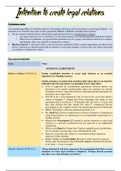Study guide
Intention to Create Legal Relations - Contract Law First Class notes
- Course
- Institution
In-depth and complete notes on Intention to Create Legal Relations, prepared for the 2019 Contract Law exam at Cambridge University. The author achieved first class for this paper (71%), including three 78% scores in the final exam, ranking third in the cohort.
[Show more]



